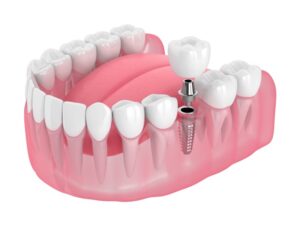
While dental implants boast a 98 percent success rate, some people worry that they will fall into the unlucky less than 5 percent whose implants did not take. While it does happen, there are steps you can take to ensure that your story is a successful one. Read on to learn more about dental implants and what you can do to make them work.
What is Dental Implant Failure?
Dental implant failure occurs when an implant doesn’t integrate properly with the jawbone or when it becomes infected or damaged over time.
Signs of failure may include an implant feeling wobbly or loose, persistent pain around the restoration, gums receding around the implant, and difficulty chewing.
Tip #1: Practice Exceptional Oral Care
Keeping your dental implants clean and bacteria-free is one of the most important things you can do to ensure their longevity, and the best way to keep them clean is brushing and flossing daily.
Brush your teeth twice a day for two minutes, floss once a day, and use mouthwash to reach the bacteria that brushing can’t. Also, be sure you visit the dentist every 6 months for checkups and cleanings.
Tip #2: Wear a Mouthguard at Night if You’re a Teeth-Grinder
Bruxism, or teeth grinding, is a subconscious habit of grinding or clenching your teeth, which could lead to damaging your dental implants. It can also cause headaches and pain in your jaw. Many people do it in their sleep and are thus unaware they do it. A checkup with your dentist can determine if you grind your teeth, especially if you experience jaw pain or headaches.
Wearing a mouthguard can protect against bruxism, so consult your dentist to determine if you are engaging in the habit.
Tip #3: Avoid Biting into Hard Foods
Just as natural teeth can fracture from crunching into a handful of almonds, so can your implants. Cut your crusty bread and raw vegetables into bite-size portions to protect your restorations against breakage. Approach eating nuts and hard candies with great care. Refrain from chewing on ice or objects like pens.
Tip #4: Be Mindful of Your Diet
Drinking lots of water throughout the day will keep your mouth producing saliva, an agent that protects your teeth from decay and plaque buildup. Limit your sugar and starch intake as they can cause tooth decay.
Tip #5: Quit Smoking and Limit Alcohol Consumption
Quitting smoking or any tobacco use can significantly improve the success and longevity of dental implants by promoting better blood flow, faster healing, and reducing the risk of infections. Moderate your alcohol drinking as it can also interfere with the healing process and lead to complications like increased bleeding and risk of infection.
As you practice smart oral health, wear a mouthguard if necessary, and watch out for those hard foods. As you continue on your tooth replacement journey, you’re sure to have successful dental implants!
About the Author
Dr. Karen Neil has served patients in the city of Fort Worth for more than 30 years. She is a Fellow of the International Academy of Implant Dentistry and was formerly president of the Fort Worth District Dental Society. If you’re curious about dental implants, visit Fort Worth Dentistry online to schedule your appointment or call the office at (817) 738-3368.
